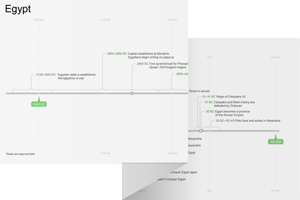47:1–12 The first part of this chapter focuses on the meeting of Joseph’s family’s with Pharaoh. Pharaoh meets first with a representative group of Joseph’s brothers and gives them the pasturelands of Goshen (vv. 1–6). Then Pharaoh meets Jacob, and Jacob blesses him (vv. 7–10). The section ends by noting the gracious and benevolent way in which Joseph provides for his family (vv. 11–12), which contrasts sharply with the section that follows (vv. 13–31). |
47:1 Goshen See note on 45:10.
47:2 he took five men Rather than presenting all of his brothers or the whole clan, Joseph takes a representative group to meet Pharaoh.
47:3 shepherds See note on 46:34.
47:4 to sojourn The Hebrew word gur links the migration of Jacob and his family with God’s prophecy to Abraham in 15:13—that his descendants would be “strangers” or “sojourners” (ger) in Egypt, which would precede their oppression.
47:5 to Joseph Pharaoh’s statement reflects the language of a formal decree. He speaks specifically to Joseph when granting permission for his family’s habitation of Goshen; this indicates that his permission is a personal favor to Joseph.
47:6 overseers of my own livestock The offer to oversee the king’s cattle would result in an elevated status for the foreigners, with all the associated legal advantages.
47:7 blessed Likely refers to a thankful greeting. The subsequent blessing (v. 10) represents a similar parting pleasantry.
47:11 the land of Rameses Another name for Goshen. The city of Rameses (Pi-Ramesses)—the capital under Pharaoh Rameses II—was located within this region. That city has been identified as Qantir (which is also called Avaris and Tell ed-Dabʾa).
47:12 Joseph provided As seen in the following section, Joseph deals far more graciously with his own family—those who initially wronged him—than with the people who welcomed him into their family, the Egyptians. He functions as a servant to his family, but he makes the people of Egypt servants to Pharaoh. This motif will be reversed in the book of Exodus (see Exod 1:8–14).
47:13–31 Joseph initiates and manages a harsh set of reforms, as the severity of the famine requires. The Egyptian people surrender their money, livestock, and farmland in exchange for the food necessary for their survival (Gen 47:14–21). These circumstances ultimately resulted in landowners becoming tenant farmers under the authority of Pharaoh—paying him one-fifth of the produce of the land (vv. 20–26). This was neither serfdom nor slavery, since the people kept 80 percent of the produce. The people express gratitude for the reforms (v. 25)—which were continued after Joseph’s death (as indicated by the editorial comment of v. 26)—likely because it gave them a chance to survive, not necessarily because they were pleased with the reforms. A consensus has not been reached on what period in Egypt’s history best reflects these reforms. |
 Famines in the Bible Table
Famines in the Bible Table
47:13 there was no food in all the land Joseph still has storehouses full of food (v. 14), but the Egyptian people are unable to grow or obtain food on their own.
47:14 Joseph collected all the money The first of the Egyptian resources that Joseph collects. The people spend all the money they have buying grain from him because they cannot produce it on their own (v. 13).
47:16 Give your livestock The second resource Joseph collects from the people of Egypt, in addition to their money (v. 14).
47:19 Buy us and our land in exchange for food The third and fourth resources Joseph takes from the people in exchange for food (see vv. 14, 17). He—or Pharaoh—now possesses all of Egypt’s money, livestock, land, and people.
47:21 he transferred them to the The people work to produce food not only for themselves, but also for Pharaoh (see note on vv. 13–31).
47:22 an allotment for the priests State-sponsored religion was exempt from Joseph’s reforms.
47:25 You have saved our lives Despite the harsh nature of Joseph’s reforms, the people are grateful to him for providing them with food and sustaining their families.
47:27 multiplied greatly This comment helps set the stage for the circumstances of Exod 1, where the Israelites are so numerous that the new era of Egyptian rulers views them as a threat to national stability.
47:28 seventeen years It is unclear why Jacob and his family do not leave Egypt after the famine ends.
47:29 put your hand under my thigh The exact Hebrew expression used here only occurs here and in 24:2. The Hebrew word commonly translated as “thigh” (yerekh) is used elsewhere as a euphemism for genitalia—in reference to where children come from (46:26; Exod 1:5; Judg 8:30).
47:30 bury me This indicates Jacob’s hope that his people would return to the promised land of Canaan (see 15:1–16).
in their burial site The place where Abraham and Isaac were buried, the Cave of Machpelah. See 25:9; 35:29.
47:31 bowed himself The Hebrew text here indicates that Jacob bows; Jacob may be worshiping or expressing thanks—or both.

|
About Faithlife Study BibleFaithlife Study Bible (FSB) is your guide to the ancient world of the Old and New Testaments, with study notes and articles that draw from a wide range of academic research. FSB helps you learn how to think about interpretation methods and issues so that you can gain a deeper understanding of the text. |
| Copyright |
Copyright 2012 Logos Bible Software. |
| Support Info | fsb |
 Loading…
Loading…

